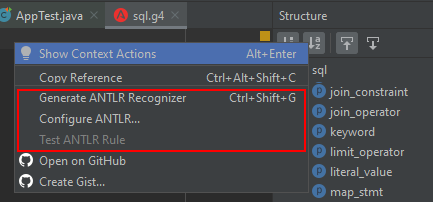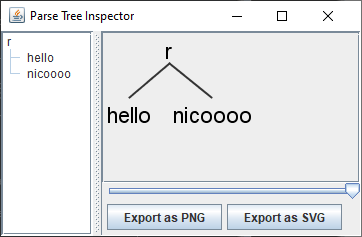Antlr - Getting Started (Hello World)
About
A getting started page that brings you in the world of Antlr.
Steps
Installation
Antlr - Installation (Version 4)
Grammar
The grammar file comes from antlr4 getting-started
Create a grammar file called Hello.g4 and define the grammar called Hello
grammar Hello; // The name of the grammar is Hello
r : 'hello' ID ; // The rule/production r match keyword `hello` followed by the rule `ID`
ID : [a-z]+ ; // The rule/production `ID` match all lower-case characters
WS : [ \t\r\n]+ -> skip ; // This WS rule (WhiteSpace) skip spaces, tabs, newlines
where:
- ID : [a-z]+ ; and WS : [ \t\r\n]+ → skip are lexer rule (name is uppercase) that defines the tokens.
- r : 'hello' ID ; is a parser rule that defines the relation between the tokens to build the parse tree
Generate the lexer and parser
with the antlr command line
cd /temp/hellog4
antlr4 Hello.g4 # Run the tool
Next to the grammar file, you got:
- the lexer HelloLexer.java - to create the token
- the listener HelloListener.java - to traverse the tree
ls -A1
Hello.g4
Hello.interp
Hello.tokens
HelloBaseListener.java
HelloLexer.interp
HelloLexer.java
HelloLexer.tokens
HelloListener.java
HelloParser.java
- Compile the java file
- The cp (class path) option should point to the antlr jar file downloaded during the installation
- javac is the compiler and is in the bin directory of the jdk (Example: c:\java\jdk1.8.0_231\bin\javac)
javac -cp "C:\antlr\antlr-4.8-complete.jar" Hello*.java # Compile the generated class
- The following compiled java class file were created
ls -A1 *.class
HelloBaseListener.class
HelloLexer.class
HelloListener.class
'HelloParser$RContext.class'
HelloParser.class
The idea plugin can also run antlr with the Generate Recognizer command
Parse and print the tree
With the LISP notation
Start grun
grun Hello r -tree
where:
- Hello is the name of the grammar (ie the file name without the extension)
- r is the start rule to where to build the tree
- -tree prints the parse tree in LISP notation.
Enter the text to parse and terminate with an End of File Character
- Type Ctrl+D (^D) on unix
- or Ctrl+Z (^Z) on Windows
hello Nico # Type hello + your name
^Z # End of file (Ctrl+Z)
- Output
(r hello nico)
With the gui parse tree inspector
With the minimal grun gui parse tree inspector
grun Hello r -gui
hello nicoooo # Type your text to parse
^Z # send an end of file ( Ctrl+Z - windows or Ctrl-Z linux)
With Idea plugin
With the idea plugin:
- right click on the line of the start rule
- start to type a text to see the tree
With Java
With all import from org.antlr.v4
public class Hello {
public static void main(String[] args) {
// The input
String input = "hello nico";
ANTLRInputStream inputStream = new ANTLRInputStream(input);
// Lexer
HelloLexer lexer = new HelloLexer(inputStream);
// Stream of token
CommonTokenStream commonTokenStream = new CommonTokenStream(lexer);
// Create the parser
HelloParser parser = new HelloParser(commonTokenStream);
// Create the tree from the r parser rule
ParseTree tree = parser.r();
// Print the tree
printNode(tree, 0, Arrays.asList(parser.getRuleNames()));
// Or with the utility function to print the LISP-style tree
// equivalent to `grun Hello r --tree`
System.out.println(tree.toStringTree(parser));
}
/**
* Recursive function to print a node
* @param node
* @param level
* @param ruleNames
*/
private static void printNode(ParseTree node, int level, List<String> ruleNames) {
String nodeText = Trees.getNodeText(node, ruleNames);
// Print
StringBuilder line = new StringBuilder();
IntStream.range(0, level).forEach(i -> line.append(" "));
line
.append("Level ")
.append(level)
.append(" - ")
.append(nodeText);
System.out.println(line.toString());
// Chilrdnre
if (node instanceof ParserRuleContext) {
ParserRuleContext parserRuleContext = (ParserRuleContext) node;
if (parserRuleContext.children != null) {
for (ParseTree child : parserRuleContext.children) {
printNode(child, level + 1, ruleNames);
}
}
}
}
}
Level 0 - r
Level 1 - hello
Level 1 - nico
- LISP
(r hello nico)
Support
Can't load Hello as lexer or parser
when starting grun, you may get the following error:
Can't load Hello as lexer or parser
This is because the lexer and parser generated class file are not in the classpath.
For dos, be sure that the doskey has the current directory (ie .;) in the classpath. Example:
doskey grun=java -cp ".;C:\antlr\antlr-4.8-complete.jar" org.antlr.v4.runtime.misc.TestRig $*


